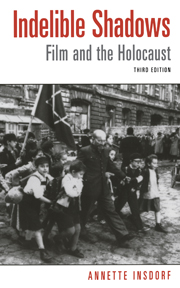Book contents
- Frontmatter
- Contents
- Foreword by Elie Wiesel
- Preface
- Introduction
- I Finding an Appropriate Language
- II Narrative Strategies
- III Responses to Nazi Atrocity
- IV Shaping Reality
- V Third Edition Update
- 14 The Holocaust as Genre
- 15 Rediscoveries
- 16 Rescuers in Fiction Films
- 17 The Ironic Touch
- 18 Dysfunction as Distortion: The Holocaust Survivor on Screen and Stage
- 19 Documentaries of Return
- Annotated Filmography (Third Edition)
- Filmography (Second Edition)
- Notes
- Bibliography (Second Edition)
- Bibliography (Third Edition)
- Relevant Websites
- Index
18 - Dysfunction as Distortion: The Holocaust Survivor on Screen and Stage
Published online by Cambridge University Press: 14 January 2010
- Frontmatter
- Contents
- Foreword by Elie Wiesel
- Preface
- Introduction
- I Finding an Appropriate Language
- II Narrative Strategies
- III Responses to Nazi Atrocity
- IV Shaping Reality
- V Third Edition Update
- 14 The Holocaust as Genre
- 15 Rediscoveries
- 16 Rescuers in Fiction Films
- 17 The Ironic Touch
- 18 Dysfunction as Distortion: The Holocaust Survivor on Screen and Stage
- 19 Documentaries of Return
- Annotated Filmography (Third Edition)
- Filmography (Second Edition)
- Notes
- Bibliography (Second Edition)
- Bibliography (Third Edition)
- Relevant Websites
- Index
Summary
The artistic representation of the dysfunctional survivor is pervasive, long-standing, and lamentable. Like the depiction of the deranged Vietnam War veteran onscreen, the cliché exists even in masterful motion pictures. The survivor's damage has been presented as extreme, from the bloody, speared hand of Sol Nazerman that closes The Pawnbroker to the heroine's suicide at the end of Sophie's Choice. By the late 1990s, the images were more subtle – and perhaps, therefore, more insidious. In two films released during 1996, Shine and The Substance of Fire, as well as two plays produced that year in New York – Old Wicked Songs and The Shawl – the Holocaust survivors are either tyrannical, suicidal, or mentally unhinged.
Shine, the Australian drama that recounts the true story of David Helfgott, and The Substance of Fire, adapted from Jon Robin Baitz's acclaimed play, share a father figure who is “damaged goods.” Peter Helfgott (Armin Mueller-Stahl) and Isaac Geldhart (Ron Rifkin) create dysfunctional families, and are depicted as dictators unable to really hear what their sons are saying. This image may be dramatically more viable than presenting “normalcy” or adaptation – and is perhaps true to a small segment of the survivor population – but is ultimately a distortion.
Shine, directed by Scott Hicks from an original screenplay by Jan Sardi, is a deeply moving film biography, tracing David Helfgott's life from child prodigy, to institutionalized recluse, to brilliant pianist. It begins in the early 1980s, when David (Geoffrey Rush, who won a well-deserved Academy Award for Best Actor) stumbles into a wine bar on a rainy night.
- Type
- Chapter
- Information
- Indelible ShadowsFilm and the Holocaust, pp. 293 - 299Publisher: Cambridge University PressPrint publication year: 2002



